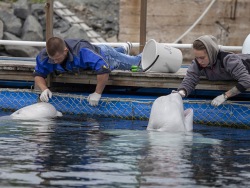Hydroacoustic studies of beluga whale sounds are under way at Primorsky Aquarium

Researchers of the Primorsky Aquarium together with their colleagues from the A.V. Zhirmunsky National Scientific Center of Marine Biology, Far Eastern Branch of the Russian Academy of Sciences (NSCMB FEB RAS) and the Far Eastern Federal University (FEFU) are carrying out collaborative hydroacoustic research aimed to discourage marine mammals from entering the vicinity of fishing gear.
The studies have been conducted since 2018 at the Marine Mammal Research Station (MMRS). Scientists use different techniques to record sounds made by beluga whales and other marine mammals. These techniques are then applied to develop recording and reproduction devices, which are later assembled by colleagues from the Pacific Branch of the Russian Federal Research Institute of Fisheries and Oceanography (TINRO).
“Hydroacoustics and communication in marine mammals have long been studied in various scientific institutions. When the Primorsky Aquarium appeared and a variety of species and individuals of marine mammals became available for scientific studies, we received a great opportunity to carry out this kind of research. We have been working on it since 2018. The NSCMB FEB RAS is primarily a basic science institution, and various kinds of applied research are carried out in cooperation with other scientific organizations like the Far-Eastern State Technical Fisheries University, the FEFU or the TINRO,” said Igor Dolmatov, Director of the National Scientific Center of Marine Biology.
As Igor Katin, Principal Specialist of the Marine Mammal Research Station (MMRS), Primorsky Aquarium, told us, scientists work on a very important task, to mitigate a conflict between fisheries and marine mammals. Many species of these animals “engage” in fishing activities by causing damage to gear and eating fish from nets, and the MMRS is a facility providing conditions to develop practices and create equipment keeping beluga whales, orcas and pinnipeds away from fishing nets.
In order to perform this task, it is necessary to establish communication with the animals, first of all producing some kind of sounds that would allow repelling them in a harmless way. The subtle point is to repel marine mammals and to attract fish simultaneously. According to the specialist, the research will definitely bring economic benefits to fishermen, as fish catches will increase. On the other hand, it will be beneficial for the Primorsky Aquarium, too, as it significantly contributes to marine mammal conservation.
“When fishermen try to save their catch, they often hit or even kill marine mammals; moreover, animals may get tangled up in nets and die. It happens all over Russian Far East seas and rivers. Therefore, it is necessary to develop a deterring device, and this work can only be done at a research station like this one, with proper equipment. It is not for field studies,” said Igor Katin.
As he noted, one of the main goals of the research is to keep animals away, and this goal can be reached by using predator calls or sounds that seals or whales emit to alert each other of danger. The scientists are testing a variety of sounds to understand which of them exert stronger effect.
A marine mammal deterrant is a system combining hydrophones, emitters, transducers and analyzers. The system works under water, which poses certain problems, because sound waves behave differently in water compared to air. The researchers are now improving the system to make it more effective.
Sergey Gorovoy, Associate Professor, Polytechnical Institute, Far Eastern Federal University, explained that their system detects sound signals produced by marine mammals and processes them. Scientists examine the results and find ways to imitate the sounds.
“We have been doing hydroacoustic research for more than five years. At first it all seemed quite simple, but then we saw that we were wrong. We have come across multiple obstacles. First of all, we assemble all devices manually. What is more, marine mammal studies have been conducted for a long time, and all soft options have already been found in this area. We are now struggling with subtler problems, more complicated but essential for our practical goals,” said the expert.”
Igor Dolmatov told us that they had had to put their investigations on hold because of coronavirus restrictions, but later the works started again. They have been gradually picking up steam. Before COVID-19, a number of preliminary results were obtained, for instance, several types of sounds emitted by marine mammals were recorded and reproduced. Also, expeditions were undertaken together with fishermen to test these results.
“We have achieved some progress on scaring away marine mammals from fishing grounds. But these results are not yet ready to be used in real life situations. Tests should be repeated and deterrent systems improved, and we are trying hard to do the job,” stressed Igor Dolmatov.